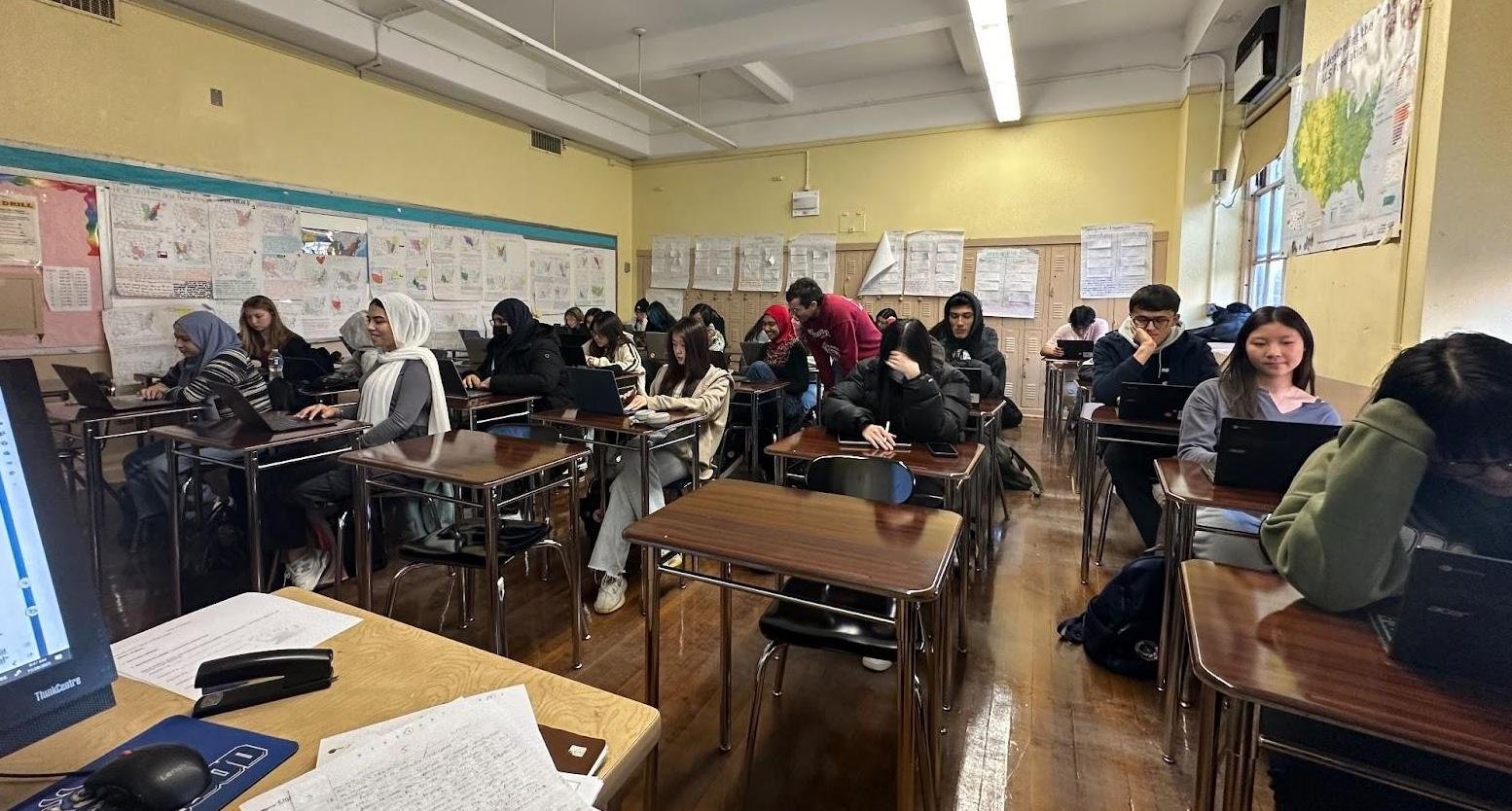Are Flipped Classrooms the Future of Education?
Mr. Naess’s Period 2 AP Human Geography class works on a religion project. Photo: Yuyu Lai
By TEHREEM NOOR and YUYU LAI
Gone are the days when you’d walk into class as an unprepared pupil, for flipped learning has taken the world by storm, even expanding into Midwood’s classrooms.
Flipped learning is a concept of education in which students are assigned a video lecture to watch at home to provide them with a general understanding of the lesson before class. The following day, students are expected to complete assigned classwork using the knowledge they’ve gained from the earlier lecture. A study noted by The Hechinger Post found that 64% of students in flipped classrooms exceeded the scores of students in conventional classes.
Several of Midwood’s teachers have jumped on the bandwagon.
“It’s something I really wanted to incorporate for a while,” said AP Human Geography and U.S. History teacher Mr. William Naess.
Mr. Naess first introduced flipped learning to his students during the Covid-19 pandemic. The goal was “to save five minutes at the start of class” to spend on supplemental skills, he said. His students would “cover their pages in notes” with information from his videos.
Nevertheless, implementing flipped learning came with its share of turbulence. “The problem is making sure that students are actually focusing on the content,” said Mr. Naess. “It also takes students who are willing to do the homework.”
“I like the videos, but sometimes I just forget,” said junior Mary Joseph, a student in Mr. Naess’s AP Human Geography class.
“The videos give me something to refer to,” said junior Molly Kantor.
Sarah Lok ‘25 said, “Honestly my grades in this class are way better, and the videos help jog my memory.”
Mr Naess’s classes aren’t the only ones reaping the benefits of flipped learning. Take the math department for example, which boasts some of its own flipped classroom users, including Mrs. Renee Goldfarb, an Algebra II teacher who has been at Midwood for 16 years.
Similar to Mr. Naess, Mrs. Goldfarb first started using flipped learning during the pandemic. According to the Flipped Learning Global Initiative, worldwide interest in flipped learning peaked in June of 2020 during the peak of the Covid-19 outbreak.
“The math department and a lot of the Algebra II teachers wanted to use flipped classrooms,” said Mrs. Goldfarb. “It was a way for us to ensure that any student who may be out due to illness would be able to keep up with the material.”
“I like flipped classrooms,” said junior Kelly Ng, a student in Mrs. Goldfarb's Algebra II Honors Class. “It allows us to learn by ourselves regardless of the circumstances.”
“In the case of math, flipped classrooms are efficient,” said Anthony Dai ‘25.
According to Mrs. Goldfarb, the feedback has been mostly positive. However, annoyances persist.
“Sometimes students find the videos can be a little lengthy,” said Mrs. Goldfarb. “A couple of teachers in the math department have been making newer videos for the upcoming semesters – that way they’re a little bit shorter and more to the point.”
Regardless, some students expressed concern with the trend.
“I work better one-on-one, and I’m just not a visual learner,” said Claudia Ng ‘26.
“Sometimes the material is far too complex for students to understand,” adds Dai.
Mr. Cameron Jahn, Midwood’s AP Chemistry teacher, is a strong advocate for flipped learning after discovering the approach at a fellowship by Math for America.
“Teaching the same class year after year, and the same thing every day, several times, can get really tedious,” said Mr. Jahn, who is in his 20th year of teaching. Flipped classrooms allow him to be a facilitator rather than a lecturer, which he believes is more effective, he said.
“I feel like everything that I would want to say, someone else has already said better – which is one of the reasons I’ve begun this in the first place,” he explained. “There’s so much good educational content out there that I feel we should be taking more advantage of.”
If flipped learning is the future, it’ll put more responsibility on students’ shoulders.
“Flipped learning is really about time management,” said Cecilia Chen ‘25, a student in Mr Jahn’s class.
“Learn time management,” said Algebra II student Ng. “You’re going to need it.”

